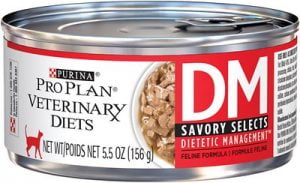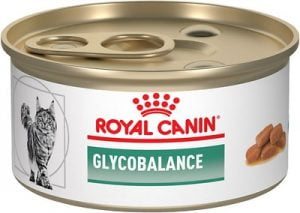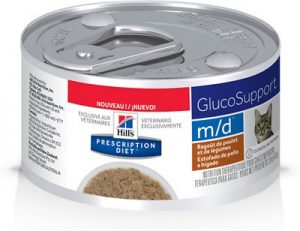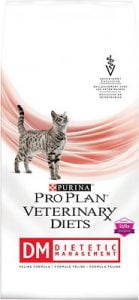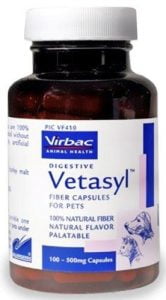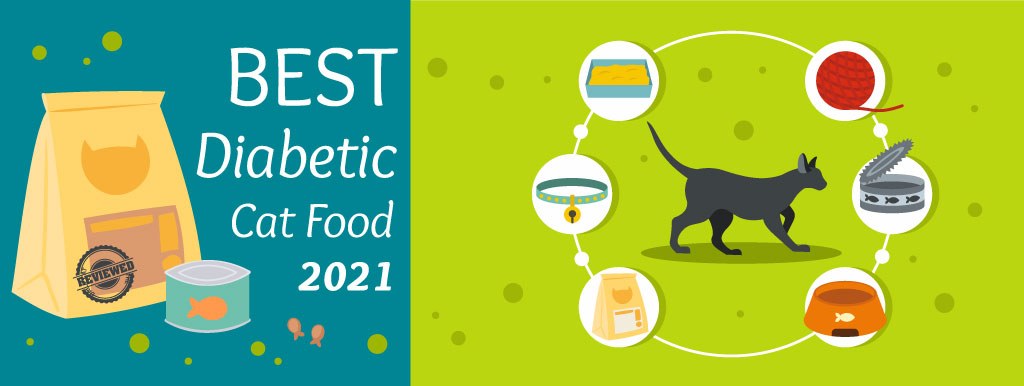
Best Diabetic Cat Food
A diabetes diagnosis for your cat is never a good thing, but it doesn’t need to be a source of serious upset or panic. If a veterinarian determines that your cat needs treatment for diabetes, the most immediate impact is likely to be felt by you, rather than your feline friend. Owners are given the task of managing daily insulin levels, as well as an increased responsibility for their pet’s diet.
Diabetic cats require day-to-day monitoring and a more active lifestyle, but the food they eat is arguably the biggest contributing environmental factor in stable blood sugar levels and overall health. In most cats, the condition is similar to Type 2 Diabetes in humans, meaning that it’s affected by both genetic and environmental factors.
As a result, the type and quantity of food given to your cat is a primary part of their treatment plan. For many diabetic cats, making adjustments to bring their diet more in line with biological needs can result in worthwhile reductions in insulin requirements—or even remission.
The latest studies on the relationship between diet and diabetes in both cats and humans suggest that insulin independence is a realistic goal when diet and insulin supplementation are given attention. When cats receive a high protein, low carbohydrate diet (as well as appropriate home blood glucose monitoring) symptoms can be dramatically improved. Some studies report diabetes remission rates exceeding 60 percent in cats receiving a combination of pharmacological and dietary treatment.
So, while it can be hard to completely avoid carbohydrates and other undesirables in today’s cat food options, it’s worth taking the time sort those foods with quality ingredients from the brands pedaling fillers and sub-par components. It’s also a good idea to have a comprehensive conversation about diet your vet, as not every cat with diabetes will benefit from the same nutritional profile.
Let’s look at the food types that do and don’t contribute to effective insulin management in cats, and which Diabetic Cat Foods make the grade for 2020.
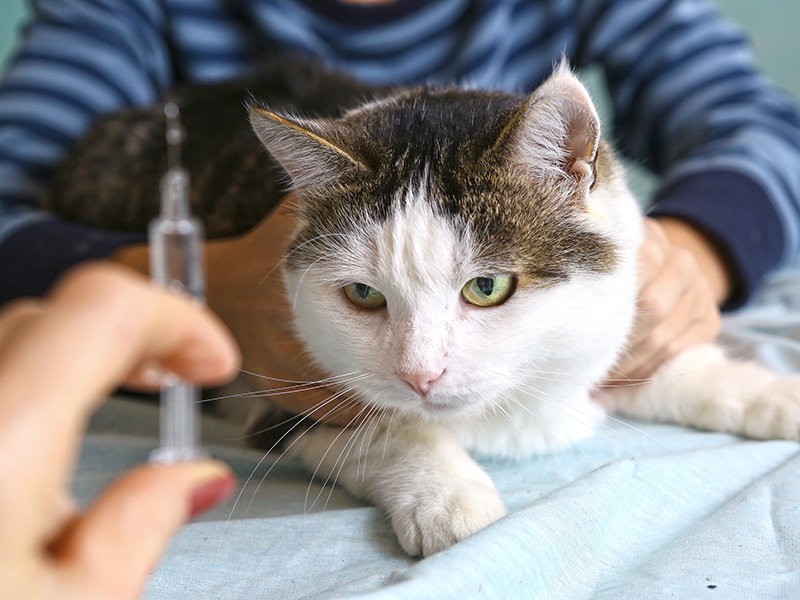
What should a cat with diabetes be eating?
Dry cat food (kibble) is compressed and concentrated in order to extend its shelf life and boost nutritional benefit. Unfortunately, to stick those little fish-shaped biscuits together, a fair amount of carbohydrate—starch—is required. With the composition of dried food also being hard to eyeball, lower quality brands may also stuff their products with as many low-cost carbs as possible.
Cats with diabetes and dry food just do not mix. In a large, owner-reported study, an association was found between cats who ate predominantly dry food and an increased risk of diabetes, even when cats were recorded as being a normal weight.
In addition, the concentrated nature of dried food means that cats aren’t receiving moisture content, which is essential for their hydration. This is doubly important for cats with diabetes, who may crave water more than normal. Moisture content also helps cats feel full, aiding portion size control.
Because of this, we’d recommend avoiding dried food products completely, lowering the risk of dehydration, and spiking your cat’s blood sugar levels with concealed carbohydrates.
Diabetes primarily affects the production of insulin, which is a hormone responsible for moving sugar through your cat’s body. Most cats with diabetes are still capable of making some insulin, but are not able to correctly process sugar. Glucose can therefore build in the bloodstream, to dangerously high levels, causing symptoms from increased thirst and urination, through kidney and urinary tract issues, up to life-threatening hypoglycemia.
As a result, any foods containing sugar—including carbohydrates and fibers—need to be handled carefully, and only given to your cat in portions that won’t result in dangerous blood-sugar levels. Management of sugars becomes more difficult in senior or overweight cats, who are likely to have decreased sensitivity to natural insulin.
When a cat’s body is struggling with sugar, food quantity and quality is of paramount importance. Owners should look to maintain their cat’s energy over a full 24-hour cycle, usually feeding them main meals during or before their insulin dose.
If portions are small enough, then some cats may also benefit from a grazing approach, where food is either left out or portioned into eight-to-twelve meals per day. The key is to find whatever feeding schedule neither spikes nor dramatically drops blood sugars.
As mentioned, blood sugar management tends to become incrementally more difficult with weight gain, so calorie counting is a necessary element of a diabetic diet. While a brand might boast about their high protein or fat content, super-nutrient dense foods with low moisture content can actually be detrimental to your cat’s treatment.
Diabetes affects cats differently depending on their genetic profile and lifestyle. In a study on UK moggies, those that were male, neutered, inactive, and weighed over five kilograms were found to be more likely to have the disease. Burmese cats stand out as being particularly at risk, being up to 3.7 times more likely to develop diabetes than non-pedigree cats.
These differences can result in a number of secondary symptoms or conditions that stem from insulin deficiency. Cats can lose or gain appetite, increase or decrease in weight, and suffer gastrointestinal upset.
Commonly, secondary conditions are related to kidney any urinary tract health, partly due to the effects of diabetes on proper hydration. Some cats may become at higher risk of developing calcium oxalate crystals (the most common cause of kidney stones.)
Alongside dietary changes, it’s important to regularly check their blood glucose levels between vet visits. This will allow you to see patterns between blood sugar and other symptoms, helping your vet to adjust treatment as necessary.
Lastly, it’s worth pointing out that the prevalence of feline diabetes is increasing alongside a rise in indoor-only cats.
While there can be many benefits to keeps cats inside, it’s critical that their diet is adjusted accordingly, and that they’re given a supplementary exercise to routine, to help keep them active.
When a few extra pounds can impact how diabetes affects your cat’s quality of life, there’s no excuse for not paying attention to what they’re eating, and how much!
Choosing the right food products for your cat
Nutritional needs for cats with diabetes
Carbohydrates
The feline species are classed as obligate carnivores, meaning that they only source nutrition from live prey and meat products. There’s some dispute about how accurate this classification is for house cats, but even if they are able to partly derive energy from carbohydrates, cats should never be consuming carbs as a significant part of their diet.
This is even more true for diabetic cats, who may have developed the condition through a carbohydrate-rich diet in the first place. Cats with diabetes should steer clear of:
- Dried foods
- Foods containing gravies or sauces (with tend to be very carb-heavy)
- Process treats
- Foods where a carbohydrate is listed in the top five ingredients (e.g. grain or cornmeal)
As you may have noticed, most pet food brands choose not to display carbohydrate content as part of the nutritional information label. The ethics of this aside, it’s not too difficult to work out the numbers for yourself, especially if the other nutrients are listed as percentages. Simply add together the protein, fat, fiber, moisture, and ash, and subtract that number from 100.
Note: there are a minority of situations where cats with secondary and related health issues, such as kidney disease, may not respond well to a low carbohydrate diet. Always seek guidance from your vet when it comes to medical aspects of diet.
Protein
A diet that’s rich in well-sourced proteins is a real and validated method of controlling diabetes symptoms and insulin levels in many cats. There have been several studies on the merits of a controlled high protein diet for cats with diabetes. In a 2001 paper, cats eating a high-protein, low-carbohydrate canned diet for three months experienced improvements in insulin levels, to the extent that insulin injections were completely stopped in three of the cats.
In cat food, the difference between good and bad protein can be subtle. While dried food or products made with so-called ‘meat-meal’ be able to claim a higher protein concentration, real meat sourced from whole animal products usually offers a more favorable nutritional profile. Try to only choose from foods that list a whole protein as the top (or even top three) ingredients.
Fats
The nutritional profile of cat food should always read protein, fats, carbohydrates, in that descending order. Cats love fats, as they source the majority of their energy from them (rather than carbs). But we need to be careful in managing the fat intake of cats with diabetes, as high levels can easily add unwanted calories to their diet, exacerbating symptoms.
Again, look for whole animal fats on the ingredients label, and follow recommendations from your vet concerning the exact amount of fat your cat should be eating. With some cats liable to lose significant weight due to diabetes, there’s a need for individual consultation and treatment.
Fiber and supplements
Most cat foods developed specifically for pets with diabetes display recommendations or certifications from nutritionists, researchers, and vets. While owners should always do there own research (starting with a careful read of the ingredients label) this can provide some assurance that food is well-balanced.
Fiber is technically a carbohydrate, but as it can’t be broken down in the same way, including some soluble and insoluble fiber in a cat’s diet can help increase blood-sugar stability and aid healthy digestion. As well as being low in sugars itself, fiber encourages slower digestion and a slower release of sugars into the body.
Best Diabetic Cat Foods
Delivering a balanced meal, low in fat and high in protein, Purina Pro Plan Veterinary Diets DM Dietetic Management Feline Formula is optimized for cats with special dietary requirements.
First ingredients:
- Water Sufficient for Processing,
- Chicken,
- Liver,
- Wheat Gluten,
- Meat By-Products
Key Benefits
- One of the best tasting wet cat foods out there! It’s also great for diabetic management
- Made using recommendations from nutritionists, researchers, and vets
- Protects against struvite and calcium oxalate crystals
- Promotes healthy levels of glucose, using a high protein, low carb recipe
- Designed to aid the unique needs of diabetic cats, whilst supporting urinary health
Proudly made in the USA, this canned wet cat food is thoughtfully formulated with quality sources of protein, vitamins and minerals.
Felines suffering from diabetes require daily monitoring, an active lifestyle as well as watching what they eat. It is crucial for pet parents to ensure diabetic kitties consume the correct amount, and type of nutrients, in order to prevent or lessen the effects of diabetes, enteritis, loose stools, etc. If you have a cat with special needs in your care, consider Purina Pro Plan’s diabetic canned cat food.
Nutritional info:
- Crude protein (min): 12.0%
- Crude fat (min): 4.5%
- Crude fiber (max): 2.0%
- Moisture (max): 78.0%
- Ash: 3.1%
Water Sufficient for Processing, Chicken, Liver, Wheat Gluten, Meat By-Products, Corn Starch-Modified, Soy Flour, Artificial and Natural Flavors, Calcium Phosphate, Potassium Chloride, L-Lysine Monohydrochloride, Taurine, Salt, Choline Chloride, Added Color, Zinc Sulfate, Ferrous Sulfate, Thiamine Mononitrate, Vitamin E Supplement, Niacin, Copper Sulfate, Manganese Sulfate, Calcium Pantothenate, Vitamin A Supplement, Menadione Sodium Bisulfite Complex (Source of Vitamin K Activity), Pyridoxine Hydrochloride, Riboflavin Supplement, Vitamin B-12 Supplement, Biotin, Folic Acid, Vitamin D-3 Supplement, Potassium Iodide.
Caloric Content
1,095 kcal/kg, 171 kcal/5.5oz can
Royal Canin Veterinary Diet Glycobalance Morsels In Gravy Canned Cat Food
Treat your kitty to a tasty meal that’s designed with her health in mind with Royal Canin Feline Glycobalance Thin Slices in Gravy Canned Cat Food.
Key Benefits
- This wet cat food helps support your kitty’s healthy blood glucose levels throughout the day.
A combination of prebiotics, soluble and insoluble fibers help minimize changes in blood glucose levels.
Contains a reduced amount of starch and moderate fat content.
High protein content helps maintain healthy muscle mass.
Promotes a healthy urinary environment by helping to prevent the development of struvite and calcium oxalate crystals.
Formulated through work with veterinarians, pet nutritionists, and cat professionals, this wet food helps keep your cat’s blood glucose levels stable and in a safe range throughout the day. A combination of prebiotics and natural fibers helps minimize glucose fluctuations, while the high protein content helps maintain your kitty’s muscle mass. It contains a reduced level of starch, moderate fat content, and promotes a healthy urinary tract. This carefully formulated diet helps provide the precise nutrition your feline friend needs.
New: Water Sufficient For Processing, Chicken Liver, Chicken, Pork Liver, Pork By-Products, Chicken By-Products, Powdered Cellulose, Pork Plasma, Gelatin, Modified Corn Starch, Wheat Flour, Natural Flavors, Calcium Carbonate, Sodium Tripolyphosphate, Calcium Sulfate, Guar Gum, Potassium Chloride, Taurine, Sodium Silico Aluminate, Carrageenan, Vitamins [L-Ascorbyl-2-Polyphosphate (Source Of Vitamin C), Dl-Alpha Tocopherol Acetate (Source Of Vitamin E), Thiamine Mononitrate (Vitamin B1), Niacin Supplement, Biotin, D-Calcium Pantothenate, Pyridoxine Hydrochloride (Vitamin B6), Riboflavin Supplement, Folic Acid, Vitamin B12 Supplement, Vitamin D3 Supplement], Wheat Gluten, Marigold Extract (Tagetes Erecta L.), Trace Minerals [Zinc Oxide, Zinc Proteinate, Ferrous Sulfate, Copper Sulfate, Manganous Oxide, Sodium Selenite, Calcium Iodate], L-Carnitine.
Original: Water Sufficient for Processing, Pork By-Products, Chicken Liver, Chicken, Wheat Gluten, Powdered Cellulose, Gelatin By-Products, Wheat Flour, Corn Starch Modified, Natural Flavors, Calcium Sulfate, Guar Gum, Calcium Carbonate, Fish Oil, Potassium Chloride, Taurine, Sodium Silico Aluminate, Potassium Phosphate, Carrageenan, Vitamins [Dl-Alpha-Tocopherol Acetate (Source of Vitamin E), L-Ascorbyl-2- Polyphosphate (Source of Vitamin C), Thiamine Mononitrate (Vitamin B1), Niacin Supplement, Biotin, D-Calcium Pantothenate, Riboflavin Supplement (Vitamin B2), Pyridoxine Hydrochloride (Vitamin B6), Vitamin B12 Supplement, Folic Acid, Vitamin D3 Supplement], L-Carnitine, Marigold Extract (Tagetes Erecta L.), Trace Minerals (Zinc Proteinate, Zinc Oxide, Ferrous Sulfate, Copper Sulfate, Manganous Oxide, Sodium Selenite, Calcium Iodate).
Caloric Content
New: 647 kcal/kg, 55 kcal/can
Original: 721 kcal/kg, 61 kcal/can
Hill’s Prescription Diet m/d GlucoSupport Chicken & Liver Stew Canned Cat Food
Help your paw-tner achieve a healthy weight with Hill’s Prescription Diet m/d GlucoSupport Chicken & Liver Stew!
Key Benefits
- Specially crafted to help your cat lose weight and maintain proper glucose levels.
Helps maintain lean muscles, reduces body fat, and supports healthy immunity
- The therapeutic levels of L-carnitine help encourage normal fat metabolism in your cat’s liver.
Made with Hill’s Prescription Diet’s S+OXSHIELD to help promote a urinary environment that helps reduce the chances of developing struvite and calcium oxalate crystals.
Crafted with real chicken and liver for the high-quality protein your cat needs and the flavor she loves.
Even a few extra pounds can lead to serious health problems for your cat—it can reduce play time and affect mobility and the general health of your feline friend. Formulated by nutritionists and veterinarians, this palatable pate contains therapeutic levels of L-carnitine and optimally balanced protein and carbohydrates to help manage your pet’s blood glucose and weight. And to top it all off, your kitty will get to enjoy the delicious flavor of real chicken and pork liver in every bite!
Water, Chicken, Pork Liver, Wheat Gluten, Potato Protein, Rice Starch, Chicken Fat, Chicken Liver Flavor, Potassium Alginate, Fish Oil, Calcium Chloride, Powdered Cellulose, Dicalcium Phosphate, Soybean Oil, Calcium Sulfate, Sodium Tripolyphosphate, Guar Gum, Taurine, vitamins (Vitamin E Supplement, Ascorbic Acid (source of Vitamin C), L-Ascorbyl-2-Polyphosphate (source of Vitamin C), Thiamine Mononitrate, Niacin Supplement, Vitamin A Supplement, Calcium Pantothenate, Vitamin B12 Supplement, Pyridoxine Hydrochloride, Riboflavin Supplement, Biotin, Menadione Sodium Bisulfite Complex (source of Vitamin K), Folic Acid, Vitamin D3 Supplement), Leucine, Potassium Chloride, Choline Chloride, L-Arginine, L-Carnitine, Magnesium Oxide, minerals (Zinc Oxide, Ferrous Sulfate, Manganese Sulfate, Copper Sulfate, Calcium Iodate), Beta-Carotene, Calcium Carbonate.
Caloric Content
78 kcal/2.9-oz (82 g)
Purina Pro Plan Veterinary Diets DM Dietetic Management Formula Dry Cat Food
Help your furry friend take on diabetes with Purina Pro Plan Veterinary Diets DM Dietetic Management Feline Formula Dry Cat Food.
Key Benefits
- Great-tasting dry cat food for diabetic management.
Crafted in collaboration with nutritionists, researchers, and veterinarians.
Specially formulated to help support the unique nutritional needs of diabetic cats.
Also features a defense against the development of both struvite and calcium oxalate crystals.
Developed with a high protein and low carbohydrate recipe that supports urinary health.
This great-tasting dry food is specially formulated to help support the unique nutritional needs of diabetic cats. It is crafted in collaboration with nutritionists, researchers, and veterinarians in a high protein and low carbohydrate recipe that supports urinary health. This dry cat food is paw-fect for all breeds of cats in any stage of life and features a defense against the development of both struvite and calcium oxalate crystals as well as healthy antioxidants for your amigo.
Poultry By-Product Meal, Soy Protein Isolate, Corn Gluten Meal, Soy Flour, Animal Fat Preserved with Mixed-Tocopherols (Form of Vitamin E), Corn Starch, Animal Liver Flavor, Calcium Carbonate, Phosphoric Acid, Fish Oil, Potassium Chloride, L-Lysine Monohydrochloride, Dl-Methionine, Choline Chloride, Taurine, Powdered Cellulose, Salt, Vitamin E Supplement, Zinc Sulfate, Ferrous Sulfate, Niacin, Manganese Sulfate, Vitamin A Supplement, Calcium Pantothenate, Thiamine Mononitrate, Copper Sulfate, Riboflavin Supplement, Vitamin B-12 Supplement, Pyridoxine Hydrochloride, Folic Acid, Vitamin D-3 Supplement, Calcium Iodate, Biotin, Menadione Sodium Bisulfite Complex (Source of Vitamin K Activity), Sodium Selenite.
Inactive Ingredients: Disodium Edta, Docusate Sodium, Pcmx, A Monosaccharide Complex (L-rhamnose, D-Galactose, D-Mannose), and FD&C Blue #1.
Caloric Content
4,118 kcal/kg, 592 kcal/cup
Vetasyl Fiber Caps 500 mg
A natural dietary fiber supplement for cats. Encourages natural elimination without the aid of chemicals, while providing a gentle, effective relief from constipation. Convenient, easy-to-administer. For dogs and cats.
Key Benefits
Coming Soon!
Coming Soon!
Coming Soon!
Coming Soon!
Coming Soon!
Coming Soon!
This is an over the counter product – it does not require a prescription.
Vetasyl is also useful in managing diabetic dogs and cats because increasing the amount of dietary fiber helps promote weight loss and slows glucose absorption from the intestinal tract, thereby reducing the postprandial (post-eating) fluctuations in blood glucose. By reducing these fluctuations, better control of hyperglycemia (elevated blood sugar levels) is achieved.
Dosage and Administration: For dogs and cats weighing over 7 lbs., sprinkle one (1) capsule per day on the food. For dogs and cats under 7 lbs., use one-half (1/2) capsule (250 mg) per day. A veterinarian may give specific directions. Follow professional advice closely.
There are no reported side effects. For veterinary use only. For best results, an ample supply of water should be available.
Precaution(s): Store at room temperature.
Caution(s): Keep out of the reach of children.
Active Ingredient(s): VETASYL™ contains psyllium husks 95%, barley malt extract powder (flavor) 5%, acacia and thiamine HCl (vitamin B1). Vetsyl Fiber Capsules are 100% natural. They are formulated without the use of preservatives, artificial flavors, or colors.
Guaranteed analysis: 5% minimum non-crude fiber.
FAQs
On a like note with humans, cats can have either type I or type II diabetes. Type I is insulin dependent because the body is not capable of producing insulin. Type II diabetes occurs when either the body can’t produce enough insulin or the organs have become insulin-resistant. Cats (especially older and overweight cats) are most likely to acquire what resembles Type II diabetes in humans.
If your cat is diagnosed with diabetes, the symptoms can have harmful effects. If left untreated, diabetes can be life-threatening and dangerous. Potential health implications include bacterial infection, hypoglycemia, liver disease and an unhealthy coat.
But don’t panic, a feline diabetes diagnosis is not an all or nothing outcome! In fact, caring for a feline with diabetes is more than manageable. Diet is one of the more important, but easier tweaks in managing healthy blood sugar levels. Most cats have Type II diabetes; in these cases food control and weight management are essential in taking care of the disease, and in some cases reducing the symptoms.
If you regularly check with your vet and keep up the right diet, activity level, rest and any medications – then your feline friend can manage their diabetes and maintain a full and happy life.
If your cat is insulin-dependent, it’s important to coordinate their meals along with their insulin dose. To avoid hypoglycemia, you can administer the dose right after they eat so they can digest the calories within a peak insulin time frame.
Furthermore, it might be a good idea to get into the habit of keeping a routine of feeding two to three meals a day rather than leaving a bowl of food out for your cat to graze on during the day. This is because free feeding could cause too many blood sugar spikes. However, in alignment with your cat’s specific condition and needs, some smaller, low carb snacks might be okay during the day.
You should always check with your vet to confirm a diabetes diagnosis if you notice the following signs and symptoms:
- Increased urination
- Increased appetite
- Dramatic weight loss
- Intense thirst
- Weakness or lethargy
- Nausea
Different cats can show different signs of diabetes, so don’t expect to see all of these symptoms in your cat. However, common signs a cat has diabetes include increased thirst and urination, dramatic weight loss, increased hunger, vomiting, collapsing, and weakness or decreased activity.
Diabetic cats need a high protein, low carbohydrate diet. Therefore wet, canned food is the best food to be feeding your cat. Already formulated with high concentrations of water and protein, wet food will provide the essential nutrient components that a diabetic cat needs.
Controlling diabetes will vary in every case, but in terms of catching on to the disease – the earlier, the better! Most cats with Type II diabetes will need to have insulin shots and all cats with Type I diabetes will need it. However, blood glucose levels can be controlled with a healthy, nutritionally balanced high-protein/low carb diet in addition to insulin injections or specific prescribed medications.
While there is no cure for feline diabetes, it is treatable. Your furry friend can live with a normal life expectancy as long as you feed the right diet and stick to your vet’s recommended treatment plan. Rest assured that if treated properly, diabetes isn’t a life-limiting illness in cats.

